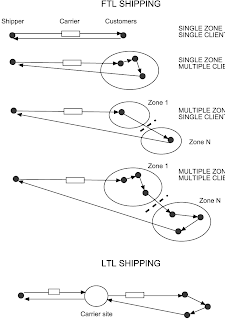When we think of shipping, a couple things come to mind:
The full shipping truck hauling heavy long-distance freight, or
The UPS truck delivering light freight and parcels
It doesn't occur to us, however, that there is any room in between. However, think about it: are there occasions where you'd want to send something over a hundred pounds, but not exactly enough to fill a whole truck? Aren't there business out there that would like to have equipment in the range [90, 16,000] pounds shipped to them from anywhere without incurring the cost of either large parcel post or whole truckload?
That's where Less than Truckload (LTL) technology steps in. LTL is like the baby bear's porridge from the story of Goldilocks: not too hot, not too cold, but just right. It seeks to meet the needs of mid-sized shipping, primarily in the B2B realm.
What is LTL?

LTL is characterized by the fact that it is a hybrid between full Truck Load (TL) and Parcel delivery services. Instead of delivering a large shipment in bulk or many different, individual parcels, LTL consolidates shipments in single pallets by destination, allowing for delivery to concentrated sites. Typically, the packages are delivered to a central distribution center and then sorted by area/destination. Sound familiar? LTL echoes the lessons learned from the Dabbawallas: other transportation methods can bring the goods to a distribution center so that a truck can pick them up. Hub-and-spoke methodology is critical to the success of LTL.
Great, but does LTL really improve the supply chain?
Although LTL sounds great to a certain segment of consumers, its usefulness has been marred by legislation (and this is the first time in this class that regulatory impact has come up). Under the 1980 Motor Carrier Act and the Trucking Industry Regulatory Reform Act, interstate trucking rates and routes were no longer regulated. According to the Bureau of Transportation Statistics, the result was that collusion between trucking companies became widespread due to the subsequent mergers and acquisitions that occurred (in favor of driving down aggregate costs for the participating firms). Because many of the providers operating LTL services were unionized, it was difficult for consolidated firms to rely on them rather than cheaper TL services, so the importance of LTL was diminished.
This shouldn't get us down though. The need to shorten supply lines and thus the logistics cost per unit of shipping requires SCM practitioners to be vigilant about how they can better organize their shipping behavior. After all, supply chain operating costs are a top concern for CFOs. While larger firms might exclusively use TL for their products due to inventory needs, they would do well to focus on the pallet-grouping behavior that LTL espouses. With forecasting methodology becoming more and more sophisticated as well as the occasional need for responsive inventories (read: Dell), knowing how to group shipments for maximum return on shipment is key to transportation strategy.
Just like how Ikea made sure their inventory was flat so it could fit inside one cargo container, firms would do well to figure out the optimal use of their trucking fleet, whether it is in-house or outsourced.
thank u
ReplyDeleteThanks for sharing.
ReplyDeleteLess-than-truckload (LTL) service is a type of transportation service for companies that require only a small shipment of goods delivered. The main advantage of using a less than truckload carrier is that a shipment may be transported for a fraction of the cost of hiring an entire truck and trailer for an exclusive shipment. Landstar a LTL service provider with cost-efficient, timely and reliable and Tracking information. They give truck-to-truck transfer process until it reaches its final destination.
A dedicated TMS will help in eliminating any kind of nuisance that occurs with full truckload and small package freight.
ReplyDeleteInternational Freight Forwarder|Best Logistics Company in India